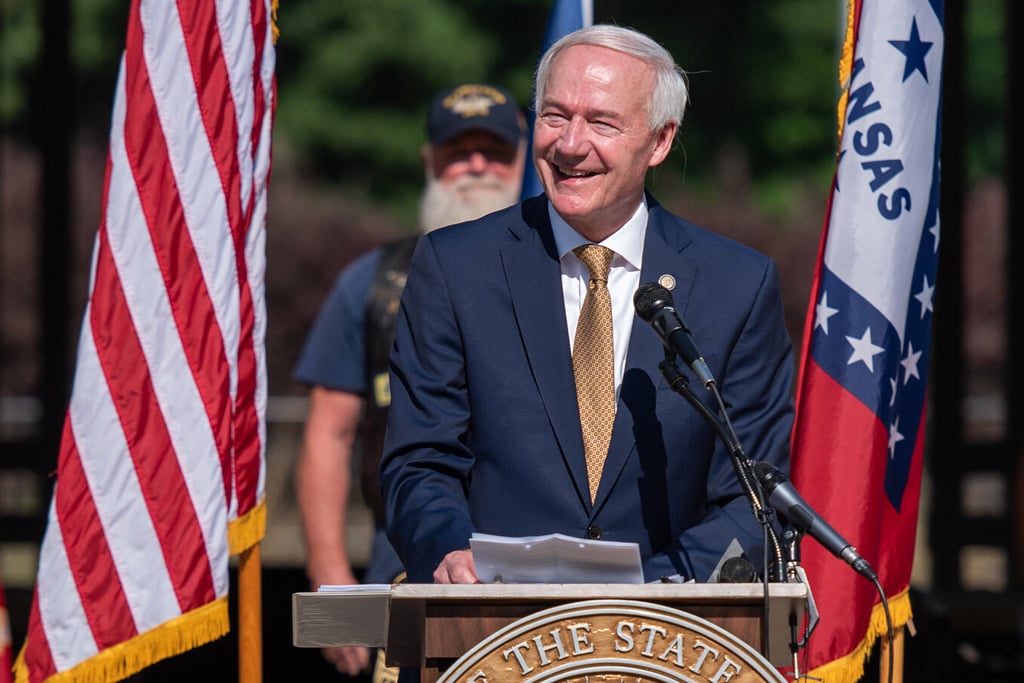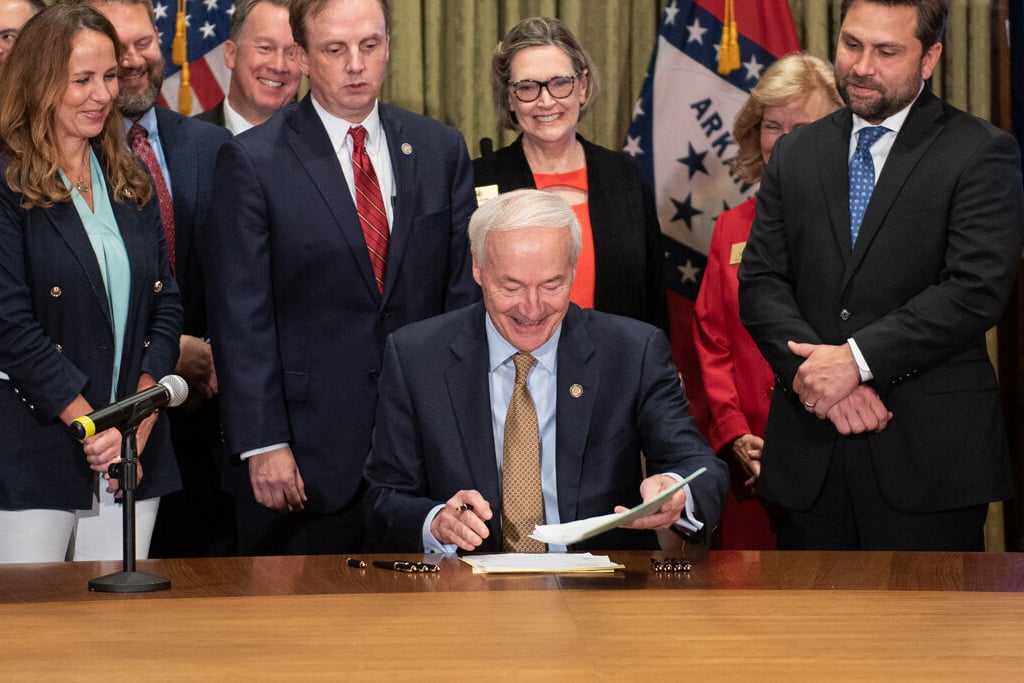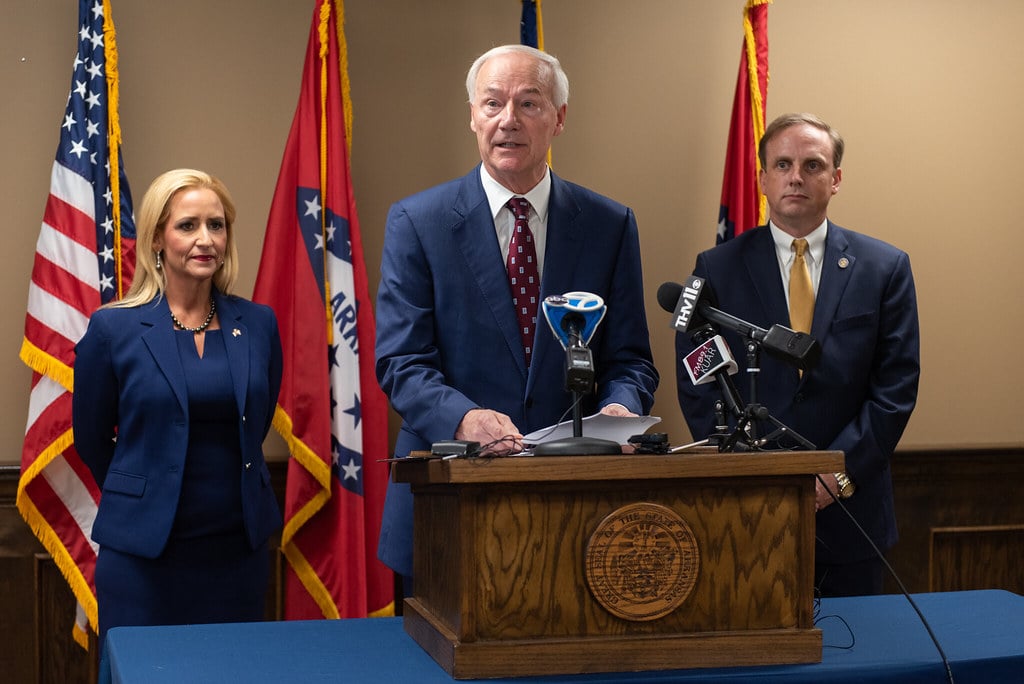 Arkansas Gov. Asa Hutchinson speaks at the Memorial Day Observance ceremony at Arkansas State Veterans Cemetery in North Little Rock on May 30, 2022. (Arkansas governor’s office)
Arkansas Gov. Asa Hutchinson speaks at the Memorial Day Observance ceremony at Arkansas State Veterans Cemetery in North Little Rock on May 30, 2022. (Arkansas governor’s office)As Arkansas Gov. Asa Hutchinson looks back on his eight years in office, what he’s most proud of might surprise you.
Sure, he takes pride in shepherding through the largest income tax cuts in state history, but that’s not the first thing he mentioned in a wide-ranging interview about his administration.
“Whenever you look at how my administration will be viewed in history, to me, we accomplished a lot of different things, but what I take the most joy in is those things that took real leadership to get done, and that probably wouldn’t have been done without your leadership,” Hutchinson said.
Those things include Hutchinson’s highway plan that required a statewide ballot initiative; Arkansas’ nation-leading school computer science initiative; and how the state managed the coronavirus pandemic.
“It was tough,” he said. “I had to go against the grain and make decisions nobody else wanted to make. I think that’s something that will be a lasting part of my legacy.”
The Republican governor is in the final weeks at the Governor’s Mansion. As he prepares to vacate the state’s chief executive office, he is weighing a campaign for the Republican presidential nomination — a decision he expects to make in the coming months.
Since taking office in 2015, Hutchinson has led the state through a pandemic, overseen monumental shifts in tax policy, scheduled the execution of eight prisoners (only four were put to death), implemented large reforms to Arkansas’ Medicaid expansion program and seen shifts in his own political party nationally and in the state.
On Trump
Hutchinson supported both of former President Donald Trump’s White House campaigns, but recently he has used appearances on nationally televised Sunday talk shows to criticize the former president.
Asked if he regrets not being a more vocal Trump critic sooner, Hutchinson noted that he was critical of some aspects of Trump’s presidency even while supporting him. The major turning point, Hutchinson said, was Jan. 6, 2021.
“When Jan. 6 happened, I was very vocal and I spoke out and saw it for exactly what it was,” he said. “For that reason, I’ve indicated I’m not supportive of his third campaign. I think I probably led the effort versus followed it, and that’s what leaders should do.”
Hutchinson acknowledged a shift in the GOP over the last decade.
“It’s shifted. It has,” he said. “Any political party is shaped and influenced by the party’s president in power that reflects that party. We were very conservative in 2014 and ‘15 when I ran and got elected. We are a conservative state and a conservative party. It changed even more when President Trump was in the White House, and I think we’re going to have some soul-searching and some, what I hope is, some corrections in the coming year before we get into 2024.”
 Arkansas Gov. Asa Hutchinson signs into law legislation to open up $50 million in grants for school security on Aug. 11, 2022. (Arkansas governor’s office)
Arkansas Gov. Asa Hutchinson signs into law legislation to open up $50 million in grants for school security on Aug. 11, 2022. (Arkansas governor’s office)Taxes
Under Hutchinson, Arkansas’ top income tax rate was cut from 7% to 4.9%. Other income tax cuts benefited low- and middle-income Arkansans.
The state has also built up significant reserves amid several years of budget surpluses.
“When we started, that was the first significant tax cuts that we had really had,” he said. “When I got elected, it was a 7% income tax rate. And you’ll remember that everybody said, ‘You’re going to make Arkansas like Kansas. You can’t do it, you can’t do it, you can’t do education.’ We managed that well, and the result is we’re at 4.9%, and we’re in the best financial shape ever.”
Hutchinson also led the ballot initiative in 2020 on the state’s highway funding. The plan was unpopular with many, particularly in the GOP.
Depending on who you ask, the measure constituted a tax increase.
The state had a temporary half-cent sales tax for highway funding that was set to expire next year, but Issue 1 in 2020 permanently extended the tax. It passed with more than 55% of the vote.
“My political capital was invested in passage of that; it was called the governor’s plan,” he said. “We passed it. That’s something that took leadership. I think that’s lasting and historic and will make a big difference for our state in decades to come.”
Several Republicans in the Legislature and statewide executive offices have called for the elimination of the state income tax.
Does Hutchinson think that could ever happen?
“I think that remains to be seen,” he said. “The key is: Sure, you could eliminate the state income tax. The question is: Are you going to have to raise other taxes and shift that because you do have to fund education? You do have to build more prisons, handle public safety. The question is: Where are those revenues going to come from.”
COVID-19
Hutchinson said there’s much you plan for as a governor, but much of what defines a term is the unexpected hurdles.
In managing the pandemic, Hutchinson often found his decisions in the crosshairs of both the political left and right.
Democrats were critical of his decisions to make Arkansas one of the first states to opt out of federal assistance meant to help residents cope with economic turmoil brought on by the pandemic.
Arkansas was one of the first states to stop offering supplemental unemployment benefits, and it rejected millions in rental assistance designed to help struggling landlords and tenants.
Some in the GOP felt he wielded too heavy of a hand in his use of emergency powers to shut down businesses and schools in early 2020.
Hutchinson said during the height of the pandemic that he read through the history of former Gov. Charles Brough, who led Arkansas through the Spanish Flu pandemic in the early 1900s.
There was no mention of the Spanish Flu.
“I thought, ‘I won’t be so lucky,’” Hutchinson joked.
 Arkansas Gov. Asa Hutchinson speaks alongside Leslie Rutledge, Arkansas Attorney General, left, and Matthew Shepherd, Speaker of the House, right, at a press conference before Rutledge signed official certification to prohibit abortions in Arkansas on Friday, June 24, 2022. (Arkansas governor’s office)
Arkansas Gov. Asa Hutchinson speaks alongside Leslie Rutledge, Arkansas Attorney General, left, and Matthew Shepherd, Speaker of the House, right, at a press conference before Rutledge signed official certification to prohibit abortions in Arkansas on Friday, June 24, 2022. (Arkansas governor’s office)Other issues
Arkansas attracted international attention in 2017 when Hutchinson scheduled eight executions in 11 days in a rush to beat the expiration date of the state’s supply of lethal injection drugs.
Pressed on whether he regretted the episode, which ended in the execution of four inmates and judicial blockages of the four others, Hutchinson took a long pause.
“I think we did what needed to be done, and my responsibility under the law,” he said. “If I had options, I certainly would not have announced eight at the same time.”
He conceded that he felt some relief that the state never acquired a new supply of lethal drugs.
The governor oversaw numerous reforms of Arkansas’ Medicaid expansion program, including the short-lived implementation of a work requirement for able-bodied adults in the program. However, he said that Medicaid expansion was an issue he inherited and didn’t feel like it was a “legacy item” for his administration.
AR Home, the latest iteration of Medicaid expansion in Arkansas, uses state and federal Medicaid dollars to buy private health insurance plans for low-income residents who make too much money to qualify for traditional Medicaid.
The initial version of Medicaid expansion was called the private option, enacted by the General Assembly and former Gov. Mike Beebe before Hutchinson was elected. It was a component of the federal Patient Protection and Affordable Care Act, commonly known as Obamacare.
“I’ve always opposed Obamacare, and the private option is a part of Obamacare,” Hutchinson said. “But, leaders deal in the real world. With what I inherited, we absolutely made the right decision. Whenever Congress did away with the individual mandate, you were essentially left with a more expanded Medicaid program, and that’s helped us in Arkansas.”
What others said
Senate President Pro Tempore Jimmy Hickey (R-Texarkana) praised Hutchinson for his time in office, pointing to his management of the pandemic.
“Anybody that gets something of that magnitude dropped on their head and negotiates through that shows great leadership ability,” he said.
When asked whether Hutchinson’s relationship with the General Assembly became more strained in his second term, Hickey said it was a natural progression.
“I think that’s just kind of the course of action of being any governor or anybody in leadership,” he said. “Whenever somebody first comes in with a Republican governor and the Republican members, they want to see that he or she is successful. Then what you’ve seen, the longer it goes the Legislature wanted to make sure that separation of powers were involved. In the end, it provided more oversight.”
Hickey said he always felt Hutchinson did what he felt was right.
 Arkansas Gov. Asa Hutchinson signs into law 2020 legislation to create a $173 million fund for Covid-19 relief on March 27, 2020. (Arkansas governor’s office)
Arkansas Gov. Asa Hutchinson signs into law 2020 legislation to create a $173 million fund for Covid-19 relief on March 27, 2020. (Arkansas governor’s office)“That’s one thing I’ll say about the governor, whether people in the Legislature agreed with him on something, if he felt it was right in his heart, he’d go against the flow,” Hickey said.
Democratic Party of Arkansas Chairman Grant Tennille was also complimentary of Hutchinson in an interview, though he said the two disagreed on plenty of policy issues.
Tennille said Hutchinson handled the pandemic well, but he disagrees “vehemently” with Hutchinson’s philosophy on taxation.
Tax relief should’ve targeted more low-income Arkansans and fewer residents in the top brackets, Tennille said. And the revenue that was lost could’ve been used to further raise teacher pay and improve public education.
“I do think that Governor Hutchinson takes pretty seriously his responsibility to try to represent everybody in Arkansas,” Tennille said.
However, Tennille said he wished Hutchinson had done more to defend attacks on transgender children during his second term.
He also criticized the governor’s decision to start the process of building a new prison. Arkansas already has too high of an incarceration rate, Tennille said.
“Let’s lock the people up we’re afraid of, not the people we’re mad at,” he said.
Tennille said that while they disagree, he and Hutchinson have always gotten along.
“Just to say it out loud, he and I get along,” Tennille said. “He has been incredibly nice to me, and he has no reason to. I sort of wish all of the relationships looked more like mine and his.”
Nicholas Horton, the founder and CEO of conservative advocacy group Opportunity Arkansas, mixed praise for Hutchinson with some disappointment that the governor didn’t go farther on some conservative priorities, like spending and education reform. He too commended the governor for his management of the pandemic.
Horton said Hutchinson deserves “tremendous” credit for implementing work requirements on the state’s Medicaid expansion and food stamps programs despite harsh national criticism.
“To me, that’s a big part of his legacy, and he should be proud of it,” he said.
On taxes, Horton said Hutchinson’s administration chipped away at income taxes in a positive way, but he said there was some frustration that tax-cut gains were offset in other areas, like the highway sales tax.
“Speaking for conservatives generally, I think the pace of that has not quite been what some of us wanted, but we have continued to move in the right direction,” Horton said.
He also said he wished Hutchinson had been more vocal on education reform and school-choice issues.
Horton noted that he’s heard Hutchinson called a great “transition governor,” being the first Republican governor to hold office alongside a GOP-dominated Legislature. Now, the stage is set for Gov.-elect Sarah Huckabee Sanders to tackle larger conservative priorities.
 Arkansas Gov. Asa Hutchinson and First Lady Susan Hutchinson wave at the governor’s second inaugural ball in January 2019. (Arkansas governor’s office)
Arkansas Gov. Asa Hutchinson and First Lady Susan Hutchinson wave at the governor’s second inaugural ball in January 2019. (Arkansas governor’s office)Regrets
Hutchinson said his regrets are few.
The pandemic, he said, stymied progress on improving reading in elementary schools, and he said he wished he had more time to tackle public safety improvements.
“The regrets are minimal, but sure, and it doesn’t take long as a governor to recognize as much as you accomplish and as much as you do to improve things in Arkansas, there is always more to do,” he said. “Governor-elect Sanders has a long list of things that need to be worked on.”
In the end, Hutchinson said he feels gratitude looking back at the last eight years.
“Being governor is the most rewarding experience I’ve ever had in public service,” he said. “It’s been an honor and a joy.”
Arkansas Advocate is part of States Newsroom, a network of news bureaus supported by grants and a coalition of donors as a 501c(3) public charity. Arkansas Advocate maintains editorial independence. Contact Editor Sonny Albarado for questions: [email protected]. Follow Arkansas Advocate on Facebook and Twitter.

